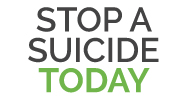ABOUT
STOP A SUICIDE TODAY
Mission
- To immediately connect those who are concerned about suicide risk in themselves or others with crisis intervention counselors and/or emergency services.
- To expand suicide risk identification beyond specialized health, organizational, and school settings to the general public by offering a free, anonymous, interactive suicide risk inventory on this website.
- To reach those who have experienced suicide ideation, plans, or attempts, but have not sought nor received treatment, nor informed their current health care provider.
- To provide educational resources about suicide, suicide risk assessment, suicide intervention and risk mitigation, and postvention support to both clinicians and the lay public.
- To maximize the utilization of the 988 Suicide & Crisis Lifeline and its cadre of trained crisis counselors who are available 24/7.
Leadership
Douglas Jacobs, M.D.
Dr. Jacobs has been on the Harvard faculty for over 40 years and the clinical staff of McLean Hospital for 30 years and is a recognized expert in suicide assessment and intervention. In the early 1990s, he initiated the concept of large-scale mental health screening for mental disorders, with the founding of National Depression Screening Day. In 2003, he was appointed chairman of the workgroup that published the American Psychiatric Association’s Practice Guideline for the Assessment and Treatment of Patient’s With Suicidal Behaviors. In 2009, he conceived of the SAFE-T suicide protocol. He recently received the Lifetime Achievement Award from the Massachusetts Coalition for Suicide Prevention.
Marci Klein-Benheim, Ph.D.
Dr. Klein-Benheim is the Director of Research for Stop A Suicide Today. She earned a bachelor’s degree from the University of Pennsylvania, a master’s degree from the Harvard Graduate School of Education, and a doctorate in clinical psychology from the University of Michigan. She has collaborated with Dr. Jacobs for over 30 years on research on a variety of psychiatric topics, including suicide, depression, and addiction. Among her publications, she has contributed chapters to The Harvard Medical School Guide to Suicide Assessment and Intervention and Suicidology: Essays in Honor of Edwin Schneidman. Most recently, she co-authored Current Status of Suicide-Focused Assessment and Treatment: An Online Resource for Clinicians.
Advisors
Ross J. Baldessarini, M.D.
Website consultant, Ross J. Baldessarini, MD, is Professor of Psychiatry (in Neuroscience) at Harvard Medical School, director of the International Consortium for Mood & Psychotic Disorders Research at McLean Hospital, and senior consultant in psychiatry at Massachusetts General Hospital. He was a career investigator of the NIMH (1970–2001) and is an internationally known research neuropsychopharmacologist. He has made many contributions to clarifying the actions and improving clinical use of antipsychotic and mood-altering medicines, developed accepted biological theories of such disorders as tardive dyskinesia and hepatic encephalopathy, and has trained over 160 laboratory and clinical investigators. He has over 3270 publications, including chapters on psychopharmacology in the standard American textbook of pharmacology (1980–2005), as well as his own monograph, Chemotherapy in Psychiatry, and serves on editorial boards of leading psychiatric and neuroscience research journals. He has been a mentor to Dr. Jacobs for many years and has provided invaluable input into the Mental Health Clinicians section of this website.
John Draper, Ph.D.
Dr. Draper is the Director of the National Suicide Prevention Lifeline and has nearly 25 years of experience in crisis intervention and suicide prevention work. He is considered one of the nation’s leading experts in crisis contact center practices (hotline, online chat, SMS services, etc.), and oversees all aspects of the federally-funded National Suicide Prevention Lifeline network, which consists of over 160 member crisis centers across the country. Dr. Draper’s work has had direct impact to the mission of this website.
Madelyn Gould, PhD, MPH
Dr. Gould is the Irving Philips Professor of Epidemiology in Psychiatry at Columbia University, Vagelos College of Physicians and Surgeons, and a Research Scientist at the New York State Psychiatric Institute (NYSPI). She directs a research unit within the Division of Child & Adolescent Psychiatry and NYSPI. Her long-standing research interests include the epidemiology of youth suicide, as well as the evaluation of youth suicide prevention interventions. During the past three decades, she has received continuous federal funding from the National Institute of Health (NIMH), Centers for Disease Control (CDC), and Substance Abuse and Mental Health Services Administration (SAMHSA) for her research in the area of suicide prevention, including evaluation of the National Suicide Prevention Lifeline. Current projects focus on the evaluation of suicide prevention strategies, including telephone crisis services, and chat crisis services which have particular relevance for this website.
